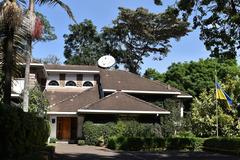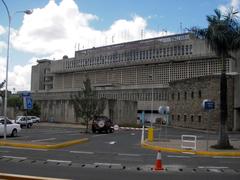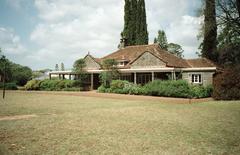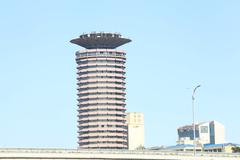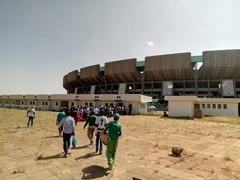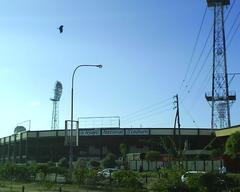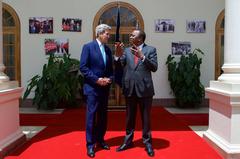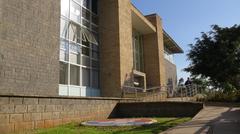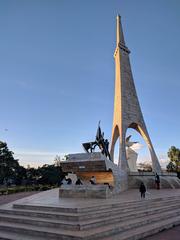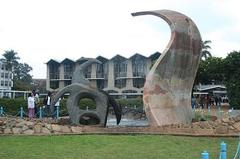Kenyatta University Visiting Hours, Tickets, and Nairobi Historical Sites Guide
Date: 14/06/2025
Introduction: The Legacy of Kenyatta University in Nairobi
Kenyatta University, situated approximately 20 kilometers northeast of Nairobi’s city center, is renowned for its academic excellence, historical significance, and vibrant campus life. Founded shortly after Kenya’s independence, the university has grown from its early days as a colonial military barracks to become one of the nation’s leading institutions of higher learning, offering a wide array of programs in fields such as education, medicine, and law. Its scenic, expansive campus and rich history make it a must-visit for prospective students, tourists, and history enthusiasts alike.
This guide provides all the essential information for planning your visit, including opening hours, ticketing, guided tours, accessibility, campus highlights, travel tips, and nearby attractions. Whether your interest lies in academics, heritage, or culture, Kenyatta University promises a rewarding and informative experience.
For official visitor information, guided tour bookings, and updates, visit the Kenyatta University official website and consult educational ranking sources like Times Higher Education.
Contents
- Introduction
- Historical Background
- University Evolution: Growth and Specialization
- Visiting Kenyatta University: Hours, Tickets, and Tours
- Accessibility and Travel Tips
- Campus Facilities and Highlights
- Nearby Attractions
- Student Life and Events
- Frequently Asked Questions (FAQs)
- Conclusion and Useful Resources
Historical Background
Kenyatta University’s origins are rooted in Kenya’s journey toward self-reliance post-independence. In 1965, the British government handed over the Templar Barracks in Kahawa to Kenya. While part of the land remained military property, the rest was transformed into Kenyatta College, named after the first president of Kenya, Jomo Kenyatta. Initially, the institution focused on A-Level education and undergraduate diploma courses, playing a vital role in addressing the shortage of local professionals and educators.
University Evolution: Growth and Specialization
In 1978, Kenyatta College evolved into Kenyatta University College, specializing in teacher education with the integration of the Faculty of Education from the University of Nairobi. By 1985, it achieved full university status, expanding its academic offerings to include medicine, law, engineering, and more. Today, Kenyatta University is recognized for its commitment to quality education and research, with a diverse student body and international accreditation.
Visiting Kenyatta University: Hours, Tickets, and Tours
Visiting Hours
- Monday – Friday: 8:00 AM to 5:00 PM
- Weekends: By prior arrangement (especially for group tours or events)
- Public Holidays: Limited access; confirm in advance
Tickets and Entry
- General Campus Entry: Free for all visitors.
- Guided Tours: Require advance booking and may attract a nominal fee.
- Special Events or Facilities: Some may require registration or tickets purchased via the official website.
Guided Campus Tours and Highlights
Guided tours offer insights into the university’s history and showcase key sites such as the main library, historic barracks buildings, state-of-the-art lecture halls, and lush green spaces. Notable photographic spots include the iconic campus entrance, tree-lined avenues, and modern academic complexes.
Accessibility and Travel Tips
Kenyatta University is easily accessible via Thika Superhighway, about a 30–40 minute drive from Nairobi’s city center. Public transport options include matatus and buses, with stops at the university’s main gate. Ride-hailing services and car rentals (Riderentals.co) are also available.
- Accessibility: The campus is wheelchair accessible, with ramps, elevators, and assistance services in most buildings.
- Security: Visitors must sign in at the gate; security is robust with patrols and surveillance.
- Weather: Nairobi is generally mild, but June–July can be chilly at night—bring warm clothing.
- Parking: Visitor parking is available; spaces may be limited during peak periods.
Campus Facilities and Highlights
Academic and Research Facilities
- 18 academic schools, including education, engineering, medicine, law, arts, and sciences (Times Higher Education).
- Modern lecture halls, laboratories, and a teaching hospital.
Library and Learning Resources
- Multi-story main library with extensive print and digital collections.
- Dedicated study zones and computer labs.
- Remote access via the KU eCitizen portal.
Accommodation and Dining
- On-campus hostels for students and visiting guests.
- Multiple cafeterias, restaurants, and cafés offering diverse cuisine.
Sports, Wellness, and Recreation
- Sports complex with stadium, indoor sports hall, Olympic-size pool, and fitness center.
- Health center with outpatient, emergency, dental, and counseling services.
Conference and Event Venues
- Kenyatta University Conference Centre (KUCC) for national and international events.
Accessibility and Security
- Campus features ramps, elevators, and accessible restrooms.
- 24/7 security patrols and controlled access points.
Nearby Attractions
When visiting Kenyatta University, consider exploring:
- Nairobi National Museum: A leading institution showcasing Kenya’s history and culture (Nairobi National Museum).
- Snake Park Nairobi: Located within the museum grounds, ideal for wildlife enthusiasts.
- Uhuru Park: A central green space perfect for relaxation.
- Karura Forest: Offers scenic trails and outdoor recreation.
- Kenya National Archives: Rich in colonial and post-colonial records.
Student Life and Events
Kenyatta University boasts a dynamic campus culture with over 70,000 students, including many international learners. The university supports diverse clubs, sports programs, cultural festivals, and public lectures. High-profile visits, such as by former U.S. President Barack Obama, have highlighted the university’s influence and reputation.
Frequently Asked Questions (FAQs)
Q: What are Kenyatta University’s visiting hours?
A: Monday to Friday, 8:00 AM to 5:00 PM. Weekend visits by arrangement.
Q: Is there an entry fee?
A: Entry is free; guided tours or special events may require a nominal fee.
Q: How do I get to Kenyatta University from Nairobi’s city center?
A: By matatu, bus, taxi, or ride-hailing services—about 30–40 minutes via Thika Road.
Q: Is the campus accessible for visitors with disabilities?
A: Yes, most buildings have ramps, elevators, and accessible restrooms.
Q: Are guided tours available?
A: Yes, book in advance via the visitor center or official website.
Q: Can I take photographs on campus?
A: Allowed in most areas; seek permission before photographing restricted zones.
Conclusion: Plan Your Visit to Kenyatta University
Kenyatta University offers visitors a glimpse into Kenya’s educational heritage, academic innovation, and vibrant community life. Its accessible, secure, and sprawling campus is ideal for academic exploration, historical discovery, and cultural engagement. Enhance your visit by exploring nearby attractions such as the Nairobi National Museum and Uhuru Park.
For the latest information on visiting hours, tours, events, or virtual experiences, consult the Kenyatta University official website, download the Audiala app for guided tours, and follow the university’s social media channels.
Additional Resources and References
- Kenyatta University Official Website
- Kenyatta University on Times Higher Education
- Kenyatta University eCitizen Portal
- Riderentals.co – Nairobi Transport Services
- Nairobi National Museum
- Study Abroad Aide – Best Universities in Kenya
- Smart Nomad Kenya – Nairobi Travel Guide
